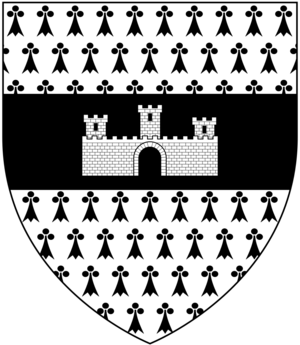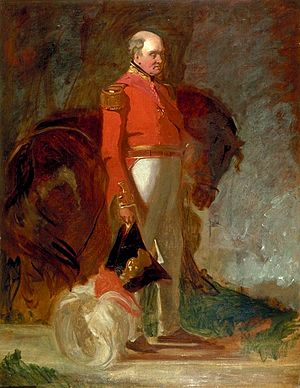Rowland Hill, 1st Viscount Hill facts for kids
Quick facts for kids
The Viscount Hill
|
|
|---|---|
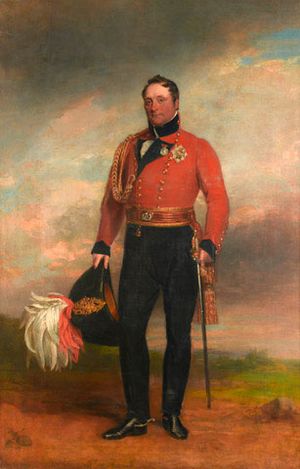
Lieutenant-General Rowland Lord Hill, 1819. Canvas by George Dawe.
|
|
| Born | 11 August 1772 Prees, Shropshire |
| Died | December 10, 1842 (aged 70) Hadnall, Shropshire |
| Allegiance | |
| Service/ |
|
| Years of service | 1790–1842 |
| Rank | General |
| Commands held | II Corps |
| Battles/wars | Napoleonic Wars Peninsular War |
| Awards | Knight Grand Cross of the Order of the Bath Knight Grand Cross of the Royal Guelphic Order Grand Cross of the Order of the Tower and Sword (Portugal) Knight Commander of the Military William Order (Netherlands) |
General Rowland Hill, 1st Viscount Hill, GCB, GCH (born August 11, 1772 – died December 10, 1842) was a brave officer in the British Army. He was also an English nobleman. He fought in the Napoleonic Wars, leading groups of soldiers. Later, in 1828, he became the top leader of the British Army, known as the Commander-in-Chief of the Forces. Soldiers really liked him and called him "Daddy Hill."
Contents
Early Life and Military Start
Rowland Hill was born on August 11, 1772, in a place called Prees Hall in Prees, Shropshire. His father, Sir John Hill, was a landowner.
Rowland went to The King's School in Chester. In 1790, he joined the army as an officer. He quickly moved up the ranks. By 1793, he was a captain.
First Battles
In 1793, he fought in the Siege of Toulon. This was a big battle where he helped deliver important messages. He then helped create a new army group called the 90th Foot. He became a colonel in 1800.
In 1801, he led his soldiers in Egypt. During a fight at Aboukir Bay, he was badly hurt when a musket ball hit his head. Even so, he helped push the French army out of Egypt. He became a brigadier in 1803 and a major-general in 1805.
Fighting in the Peninsular War
During the Peninsular War, Rowland Hill led a group of soldiers in many important battles. These included the Battle of Roliça and the Battle of Vimeiro in 1808. He also fought in the Battle of Corunna.
Crossing the River Douro
In 1809, he served under Wellington at the Second Battle of Porto. Hill's soldiers made a surprise attack across the Douro River. This attack helped defeat the French army.
Battle of Talavera
Hill led the 2nd Division at the Battle of Talavera. The night before the battle, the French launched a surprise attack. They took control of an important hill. Hill quickly led his reserve soldiers forward in the dark. They fought hard and took the hill back. This was one of the first times Hill was said to have used strong language!
More Victories
Hill continued to lead the 2nd Division in 1810 at the Battle of Bussaco. In 1811, Wellington gave Hill command of 16,000 men. Their job was to watch the city of Badajoz. On October 28, he led a successful attack on the French at the Battle of Arroyo dos Molinos.
In 1812, after the British captured Badajoz, Hill led another attack. This time, he destroyed a key bridge at the Battle of Almaraz. While Wellington won the Battle of Salamanca, Hill protected Badajoz with his large army. He was promoted to lieutenant general in 1811.
Leading a Corps
After the British took Madrid, Hill was in charge of an army of 30,000 men. He led the Right Column at the important Battle of Vitoria on June 21, 1813. He also fought in the Battle of the Pyrenees. For his great leadership, he received a special medal. He also led the Right Corps at the Battle of Nivelle in November 1813.
Defending St-Pierre d'Irube
On December 13, 1813, during the Battle of the Nive, Hill showed his amazing skill. His 14,000 men were separated from the main army by a broken bridge. Yet, Hill held off 30,000 French soldiers. He fought with great skill, moving to every dangerous spot. Wellington later said, "The best of Hill is that I always know where to find him."
A Caring Leader
Rowland Hill was known as "Daddy Hill" because he truly cared for his soldiers. He always looked out for them. Once, he gave a wounded officer a lunch basket. Another time, a sergeant delivered a letter to Hill. The general made sure the sergeant had supper and a place to sleep. The next day, Hill gave him food and money for his journey.
Hill was also a Member of Parliament for Shrewsbury from 1812 to 1814. He then became a nobleman, known as Baron Hill. This came with a pension of £2,000.
Waterloo and Later Years
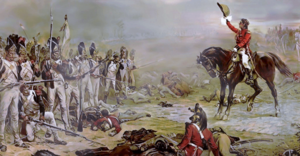
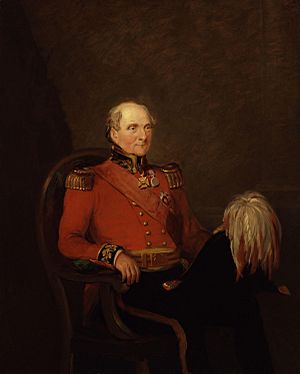
At the famous Battle of Waterloo, Hill commanded the II Corps. He led a brave charge against the French Imperial Guard near the end of the battle. For a moment, people thought he had been killed. But he was unharmed. After the battle, he wrote to his sister, saying it was the most tremendous battle ever fought. He stayed with the army in France until 1818.
Awards and Recognition
After Waterloo, he received many awards from other countries. He became a Knight Grand Cross of the Order of the Bath in 1815. He also received honors from Austria, Russia, and the Netherlands.
In 1821, at the coronation of King George IV, Lord Hill carried the Standard of England. From 1828 to 1842, he took over from the Duke of Wellington as the Commander-in-Chief of the Forces. He also became Viscount Hill in 1842.
Interests and Legacy
Rowland Hill loved foxhunting. He was the master of the North Shropshire Foxhounds until 1823. This group still exists today. He also started the Hawkstone Otter Hunt around 1800.
He died on December 10, 1842, at Hardwicke Grange in Hadnall, Shropshire. He is buried in the churchyard there.
Family Life
Rowland Hill never married. When he died, his title passed to his nephew, Rowland Hill, 2nd Viscount Hill. Rowland had three brothers—Thomas, Robert, and Clement—who also became military officers. They were all present at the Battle of Waterloo.
See also
- Viscount Hill
- Hawkstone Park
- Lord Hill's Column
 | Anna J. Cooper |
 | Mary McLeod Bethune |
 | Lillie Mae Bradford |


